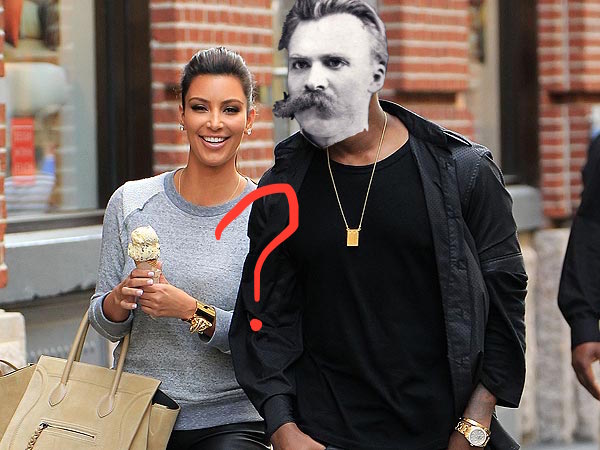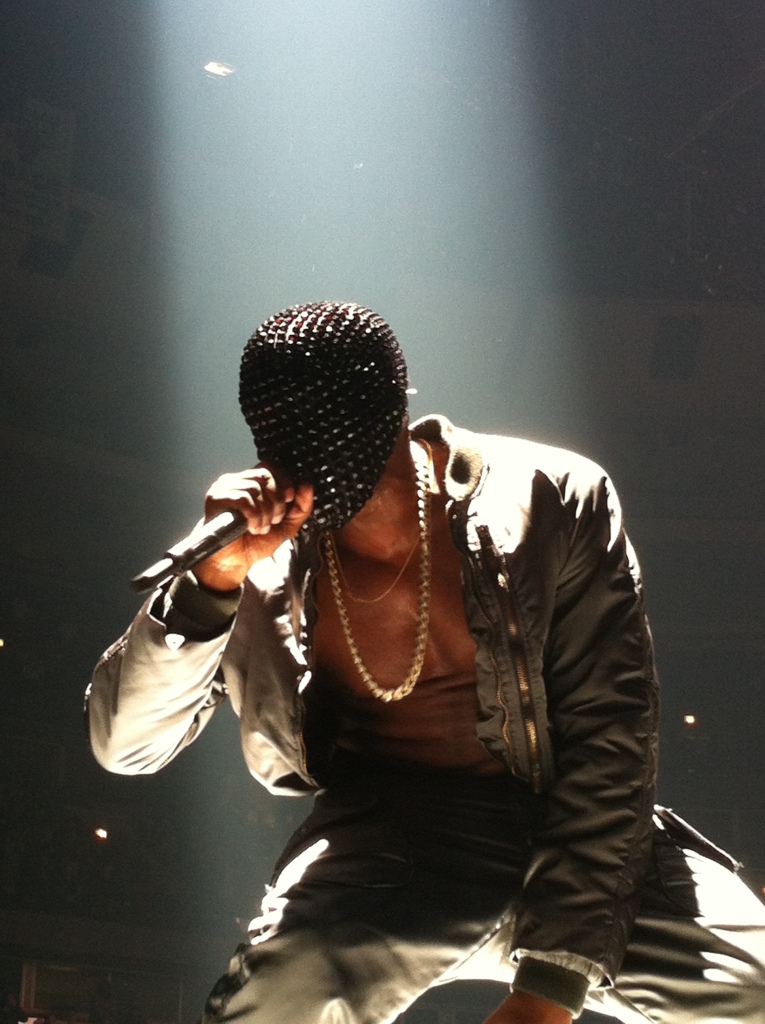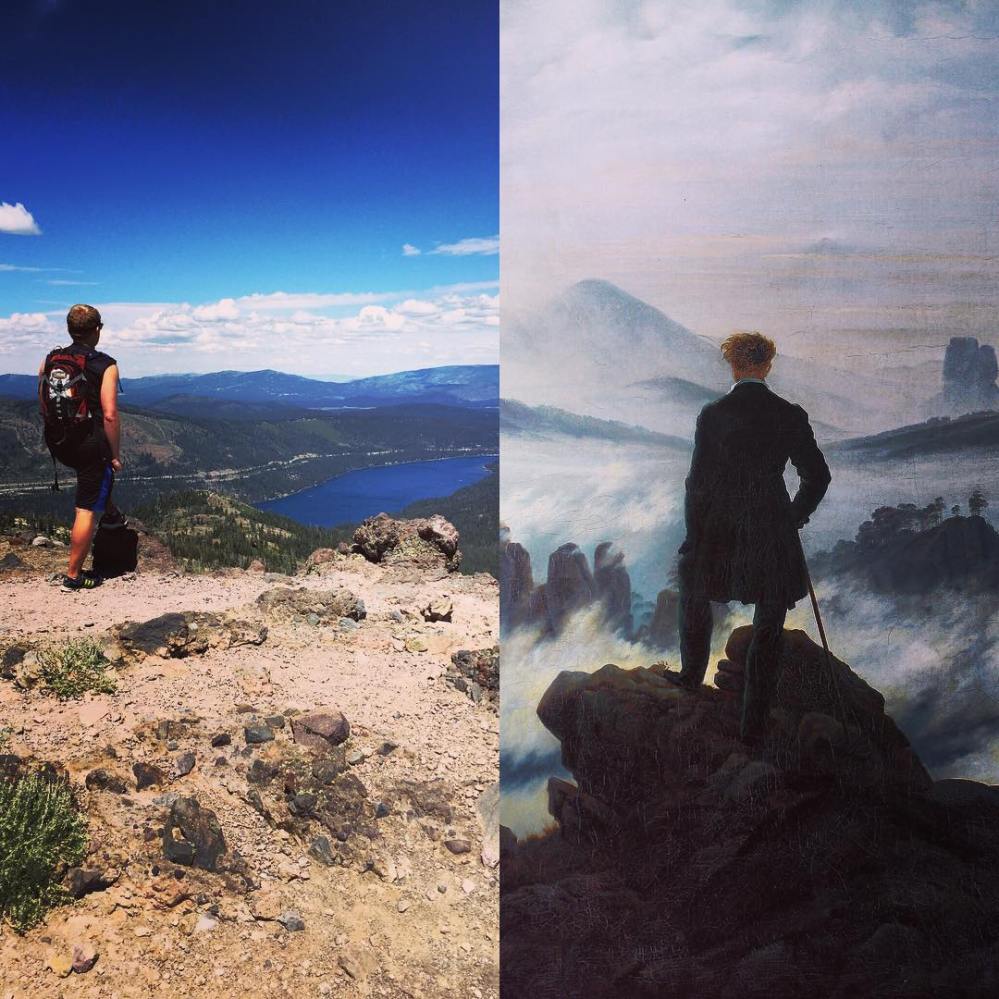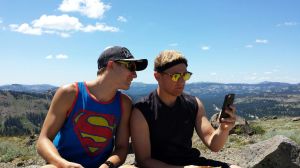
Is Kanye West The Übermensch?
Is Kanye West the Übermensch?
Get your scuba suits on and prepare to dive headfirst into one of the most polarizing, complex, crazy, egotistical personalities of the past ten years: we’re analyzing Kanye through Friedrich Nietzsche’s eyes today.
For the first decade of Kanye West’s recording career, I couldn’t have cared less about him. I had never really given him, or rap as a whole, the time of day—it was the music that I’d heard at bar mitzvahs and dances, and in cars where someone cooler than me was controlling the radio. I had of course seen South Park absolutely destroy him in the classic 2009 episode “Fishsticks,” and my friends had extolled the brilliance of Yeezy’s next two albums (My Beautiful Dark Twisted Fantasy and Watch the Throne). It took extended exposure to serious ‘Ye aficionados in the sequestered environ of overnight camp to finally get me interested. Ironically, it was the anti-commercial Yeezus that hooked me, and “Black Skinhead” that became the song of my summer of 2013. We got the campers to pound the beat from the song on the lunch tables, because campers are impressionable and think good counselors are the coolest people ever. My posse and I even rewrote it with clean, camp-themed lyrics to and performed it live at the staff show. You could have called us disciples or just obsessed.
Then I saw Kanye on the Yeezus Tour that December, and all of a sudden he was transmuted into a champion in my eyes. There he was, six feet from me on the stage—we got there really early—and for two hours he bombarded me with sheer inspiration. The show was an artistic masterpiece complete with a dozen anonymous female dancers, a huge ass mountain, and appearances by a monster and Jesus, not to mention Kanye’s various and terrifying masks. I marveled at his autotuned rant that somehow moved me nearly to tears despite making no sense whatsoever, and I started to realize that no matter how crazy he appeared in his interviews and how many foolish decisions he made in the public eye, this was a true creative genius. For me, the question shifted from “Why does Kanye act so strangely?” to “Has Kanye transcended humanity?”
I was just beginning my study of Nietzsche at the time, and as I read about his concept of the übermensch, it was only natural for me to wonder if Kanye West fit the description. Now, “übermensch” is a term that’s been corrupted to hell by the Nazis—another atrocity we can thank them for—so your conception of it probably doesn’t match Nietzsche’s original intention. In a nutshell, here’s what the übermensch is:
- A person who affirms life at every moment. That means all of life’s energy—the good and the bad, but most of all the spontaneous. Nietzsche calls this spontaneous, ecstatic aspect of life force the Dionysian, and its channeling the will to power.
- A person who is unfettered by existing systems of morality, values, and organized religion–the übermensch creates their own values every moment. You might think this would allow them to justify killing, stealing, etc., but you’d be wrong, because the übermensch isn’t troubled by the types of concerns that would drive people to kill or steal.
- A person who escapes the influence of society and of their own past. I’d go into how Nietzsche thinks this is possible, but it’s pretty complex. If you want a more comprehensive explanation of the übermensch, the Stanford Encyclopedia of Philosophy does a great job of explaining his development of the concept in his seminal mid-1880s work Thus Spoke Zarathustra.
The most important thing to remember is this: the übermensch isn’t about overcoming other people—it’s about overcoming yourself and anything that gets in the way of you expressing your life energy honestly.
So with that in mind, I decided to go back and listen to every Kanye West song, in order, from the very beginning of The College Dropout to the last notes of “All Day.” I also looked up interview clips ranging from the tame to the bizarre, looking for some sort of indication that I had found the “higher man” of whom Nietzsche speaks. What I found instead was a walking, rapping, screaming, living contradiction who is variously the epitome and the antithesis of the übermensch. I’ll parse it all out for you right now.
KANYE’S MUSIC
No matter what you think of Kanye West as a person, his influence on hip hop and culture has been undeniably enormous and positive. That said, opinions of Kanye the rapper are not as universally acclamatory as those of Kanye the producer. It’s in the latter of those two fields—production—that I think the strongest Nietzschean traits come out of Yeezy. He’s never been satisfied with a single sound, and even when he’s found something that resonates with an audience and tops the charts he follows a different creative stream with his next work. That, to me, is the most amazing thing about his career: as with the Beatles, all of his work has been critically lauded (even if it took some time), but his fans can’t agree on which of his albums is the best. Some long for a return to the sped-up soul samples that populated The College Dropout and Late Registration, and were thrilled when he returned to that style with “Bound 2” at the end of Yeezus. Others love the synth-blasting arena rock of Graduation, or the bombast of My Beautiful Dark Twisted Fantasy, or the opulence of Watch the Throne, or the sheer chaos and primalism of Yeezus. Even 808s, which a lot of listeners disliked in its time and is still his worst-reviewed album, set the tone for the dark, minimalistic, singing-heavy electro-hop that Drake and Kid Cudi would perfect and bring into the mainstream. I’d expect that in twenty years, people will look back on that album with different, wiser eyes.
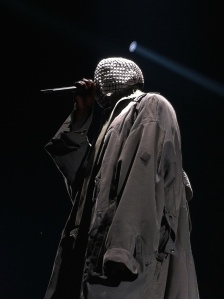 No matter what style Kanye’s production has had, though, he’s found success and managed to stay ahead of the current tastes in the hip hop world. Most importantly, he hasn’t just settled into one aesthetic and allowed it to define his career, which is what doomed T-Pain, Nelly, AC/DC, Nickelback, and other acts that remain firmly stuck in the past. If the übermensch is all about overcoming his own past and living ahistorically, Kanye’s music fits the bill perfectly. He could have made another “Gold Digger” using more Ray Charles samples and it probably would have been successful, but instead he ditched the style that had brought him to fame, took a creative risk with Graduation and its “stadium status” synths and Steely Dan excerpts, and still landed a number one single with “Stronger”–which, incidentally, rephrases Nietzsche’s famous dictum from Ecce Homo: “That which does not kill me makes me stronger.” Every single work has overcome its predecessor and created a vastly different soundscape based largely upon how Kanye was feeling at the time—his music has expressed the sentiments of a heartbroken cyborg, a triumphalist peacock, and a rabid specter at various points in his career, running the gamut of experiences and affirming the occurrence of life in all its glory and sadness. Nothing is ignored as Kanye moves constantly forward in his music career and creates new musical value out of nothingness—a clear sign of his ascension to the plane of the higher man.
No matter what style Kanye’s production has had, though, he’s found success and managed to stay ahead of the current tastes in the hip hop world. Most importantly, he hasn’t just settled into one aesthetic and allowed it to define his career, which is what doomed T-Pain, Nelly, AC/DC, Nickelback, and other acts that remain firmly stuck in the past. If the übermensch is all about overcoming his own past and living ahistorically, Kanye’s music fits the bill perfectly. He could have made another “Gold Digger” using more Ray Charles samples and it probably would have been successful, but instead he ditched the style that had brought him to fame, took a creative risk with Graduation and its “stadium status” synths and Steely Dan excerpts, and still landed a number one single with “Stronger”–which, incidentally, rephrases Nietzsche’s famous dictum from Ecce Homo: “That which does not kill me makes me stronger.” Every single work has overcome its predecessor and created a vastly different soundscape based largely upon how Kanye was feeling at the time—his music has expressed the sentiments of a heartbroken cyborg, a triumphalist peacock, and a rabid specter at various points in his career, running the gamut of experiences and affirming the occurrence of life in all its glory and sadness. Nothing is ignored as Kanye moves constantly forward in his music career and creates new musical value out of nothingness—a clear sign of his ascension to the plane of the higher man.
In particular, I find Yeezus to be, in itself, an incredible expression of Dionysian energy. From the very beginning of “On Sight,” Kanye’s production on this album takes an animalistic tone, the type that reminisces upon the ancient Greek moonlit frenzies and sacrifice-orgies undertaken in the name of their wine god. There’s dog barks on “I’m In It,” Yoko Ono-esque shrieks on “I Am a God,” and the intense breathing and tribal yells that form crucial parts of “Black Skinhead’s” infectious beat. But what makes Yeezus a true sonic manifestation of the übermensch is its total unpredictability. The best moment on the album comes 1:07 into “Blood on the Leaves,” when Kanye’s emotive autotuned singing over a haunting sample of Nina Simone’s “Strange Fruit” is suddenly overtaken by the massive synth-brass TNGHT sample that immediately turns the song from a ghostly ballad into a pained banger. The transition is unexpected, instant, and so rapidly changes the beat’s value that any notion of what the song was going to mean no longer applies—and that’s the will to power at work. You can also hear it in the children’s choir that interrupts “On Sight,” the busting-through of Hungarian prog-rock band Omega at the end of “New Slaves,” and Kanye’s surprising return to his soulful production roots on “Bound 2,” the album’s final track.
So if we were to just look at Kanye West’s music, we’d have a pretty convincing argument for his being the higher man. There’s constant creation of value, freedom from set beliefs and other people’s direct influence, and Kanye’s overcoming of his own past. Unfortunately, Yeezy’s music is accompanied by…
KANYE’S LYRICS
…and here’s where our comparison starts to run into problems.
While he is far more noteworthy as a producer than a rapper, Kanye has written some important and powerful lyrics over the course of his career. From the very beginning of The College Dropout, whose first hook states, “We don’t care what people say,” he makes it clear that he will not be confined by any other person’s expectations of him, and in general this theme has dominated his work over the past eleven years. Even though on his debut this struggle for self-determination is framed most explicitly through his battle to be taken seriously as a non-gangsta rapper—as depicted nicely in “Family Business,” which includes the verse “I woke up early this morning with a new state of mind/A creative way to rhyme without using knives and guns”—Kanye consistently finds new ways to portray his battle against others’ definitions of him. In itself, this mission is one Nietzsche would praise, particularly as it shifts in focus over time.
For the record, I think that Kanye isn’t taken seriously enough as a political rapper. His infamous accusation that “George Bush doesn’t care about black people” and verses like “I treat cash the way the government treats AIDS/I won’t be satisfied til all my niggas get it” (from “Gorgeous”) might come off as propagation of conspiracy theories, but they’re rooted in ‘Ye’s very real and very accurate perception of the low ceiling forced upon African-Americans in the United States, which he’s alternately discussed from his own perspective and from that of the black community. The College Dropout’s “All Falls Down”—in my opinion, some of the best lyrical work Kanye’s ever done—offers the first classic Yeezian combo take on race and materialism:
We shine because they hate us, floss cause they degrade us
We trying to buy back our 40 acres
And for that paper, look how low we would stoop
Even if you in a Benz, you still a nigga in a coupe.
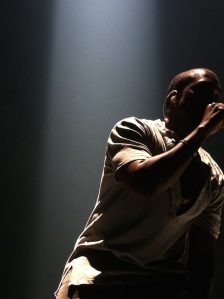 Even now that he’s a critically and commercially acclaimed hip hop superstar, the dual pillars of racism and material wealth remain constant topics of Kanye’s music, two interrelated but vastly different lenses through which we can examine Kanye’s whole career. While his take on the black plight in America has maintained a steady and very successful course—Kanye’s the rare 21st century rapper, up there with Kendrick Lamar and Jay-Z, who can simultaneously top charts and speak to racial issues in songs like “All Falls Down,” “Crack Music,” “Gorgeous,” and “Murder to Excellence”—his take on fame and riches has vacillated enormously on a song-to-song basis, an incongruity that has come to define Kanye as a split consciousness. He glorifies the “Good Life” even as he decries the “Flashing Lights” that come with it. He “looks down at his diamond encrusted piece” and the thought that springs to mind is, “No one man should have all that POWER.” For every Kanye that revels in the glory, sex, and debauchery that comes with life at the top of the cultural hierarchy, there’s a Kanye who is painfully aware of the self-annihilating process it entails.
Even now that he’s a critically and commercially acclaimed hip hop superstar, the dual pillars of racism and material wealth remain constant topics of Kanye’s music, two interrelated but vastly different lenses through which we can examine Kanye’s whole career. While his take on the black plight in America has maintained a steady and very successful course—Kanye’s the rare 21st century rapper, up there with Kendrick Lamar and Jay-Z, who can simultaneously top charts and speak to racial issues in songs like “All Falls Down,” “Crack Music,” “Gorgeous,” and “Murder to Excellence”—his take on fame and riches has vacillated enormously on a song-to-song basis, an incongruity that has come to define Kanye as a split consciousness. He glorifies the “Good Life” even as he decries the “Flashing Lights” that come with it. He “looks down at his diamond encrusted piece” and the thought that springs to mind is, “No one man should have all that POWER.” For every Kanye that revels in the glory, sex, and debauchery that comes with life at the top of the cultural hierarchy, there’s a Kanye who is painfully aware of the self-annihilating process it entails.
On no album is the split personality of Kanye more prevalent than My Beautiful Dark Twisted Fantasy, which is rightly termed his masterpiece in production, lyrical themes, and overall catharsis. Nietzsche, the man who lauded Greek tragedy for its perfect balance of the Apollonian and Dionysian life forces, would have listened to “Runaway” and fainted in ecstasy. The last four minutes of the song, with their auto-tuned mumbling over the most beautiful strings arrangement composed this side of The Lord of the Rings soundtrack, perfectly embody everything Nietzsche wrote about allowing the will to power to overcome all values and formations, as Kanye’s words literally disintegrate into distortion and the listener is left with pure feeling and a mournful ecstasy.
And yet the very notion of Kanye the living contradiction is what prevents him from truly embodying the übermensch. Despite his ability to diagnose the American neurosis stemming from our obsession with material wealth, Kanye himself is a slave to money, fame, and nice things. He also has a penchant for defending his place among the world’s rappers, and even though his willingness to speak without a filter and weather the public’s judgment transcends the current value placed on political correctness, he seems to care a great deal about how he is perceived in the hip hop and fashion arenas. Most importantly, Kanye is a devout Christian who has never shied away from his belief— “Jesus Walks” made him famous, after all—but also has the temerity to buck his faith’s monotheism and declare, “I am a God.” We need only look at the second verse of that song to see examples of all three of these contradictions:
I just talked to Jesus
He said, “What up, Yeezus?”
I said, “Shit, I’m chillin’,
Tryna stack these millions
I know he the most high
But I am a close high
Mi casa, su casa
That’s our cosa nostra
I am a god.
Nietzsche, who notably wrote that “God is dead and we have killed him,” fingered Christianity as the prime example of a concrete value system that needs to be overcome. Not only is Kanye incapable of overcoming his belief in Jesus Christ the Savior, but he also mistakenly believes that he can be a committed Christian who somehow is also a god: that’s heresy, and worse, it’s a personal dishonesty that Nietzsche can’t abide. Kanye’s also calling himself the closest thing to Jesus in terms of his influence and fame, which is a plea for recognition with which the übermensch should not have to be concerned. If Yeezy’s telling people to kneel before him, he’s clearly dependent on their adoration for his own self-affirmation, a value he needs to overcome. And then there’s the ubiquitous reference to making money, a goal upon which Kanye reneges on the very next song off of Yeezus, the brilliant “New Slaves.” The higher man should not be pursuing anything that would enslave him, particularly not when he openly realizes that it’s a toxin.
IN CONCLUSION
Sometimes I wonder whether Kanye’s outspokenness and utter lack of filter are just a marketing ploy. Obviously he wouldn’t be nearly the cultural icon that he is if he didn’t match his groundbreaking music with his brash personality, so it’s a fair question. Personally, though, I’m inclined to give him the benefit of the doubt. I don’t think he’s faking in interviews like this.
Even though Kanye is not an übermensch, it’s still worthwhile to consider the value he provides to popular culture, which I think is considerable. The primary reason people hate on him is that he’s willing to say anything and doesn’t hesitate to express a high opinion of himself. But is that really a reason to despise someone as vociferously as much of the public despises Kanye? He’s certainly guilty of some self-aggrandizement, and “tactless” is a mild way of describing his putdowns of George Bush, Taylor Swift, and Beck. But in recent years, he’s learned to apologize for some of his crazier outbursts, and the statements from which he doesn’t back down are comparisons that I think he can back up—why hasn’t he earned the right to think of himself in the light of Da Vinci or Walt Disney when his music has made such a powerful impact on the hip hop world? At least within his sphere, he deserves to be called a master, if not the master. If you’re going to hate on Kanye, hate on him for the content of his lyrics, which arguably perpetuate misogynoir (the oppression of black women). But aside from that problematic issue, the fact that Kanye is willing to speak his mind is so important to the preservation of free thought in a day and age when speaking off the cuff risks instant demonization by an online mob.
Kanye West might not live up to Nietzsche’s ideal for the higher man, but he is a “close high,” and for that he’s earned my respect. Now let’s hope his next album—expected later this year—continues to transcend the values of rap music.
